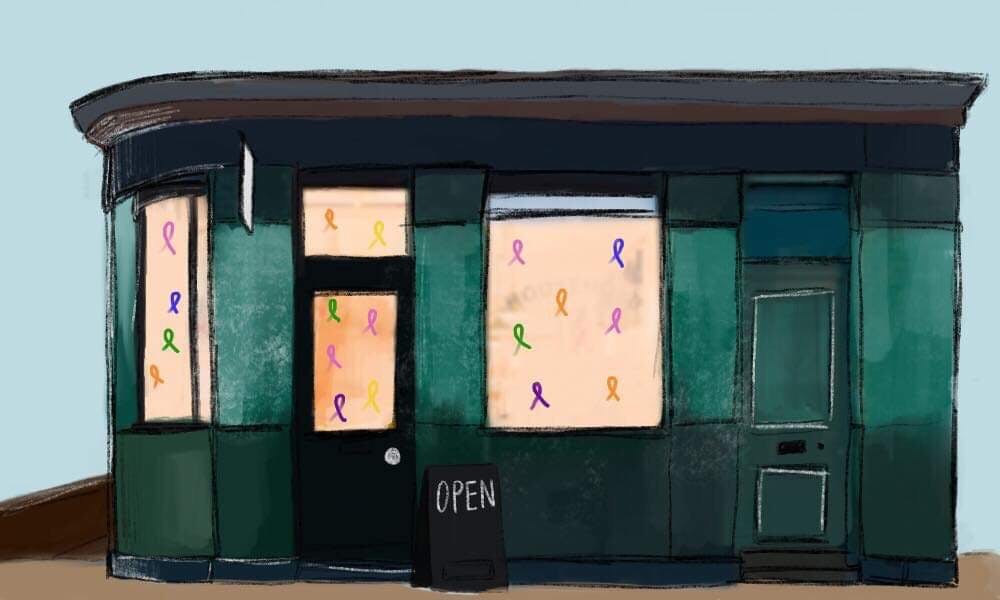At the risk of being a stereotype, I will admit that my diet consists of mainly bagels. So imagine my delight when Panera Bread announced that its Pink Ribbon Bagels would return to select stores in 2018. As explained by Panera’s website, a portion of the proceeds from this bagel’s sales are donated to “help fight against Breast Cancer.”
Considering breast cancer has profoundly affected my life, the amount of organizations and companies that advertise “pink ribbon” anything during the month of October sometimes seems overwhelming. I have always viewed this kind of advocacy as a beautiful display of solidarity and acknowledgement.
That is, until just recently when my mother, a survivor herself, called me the other day about what she deemed an enlightening discussion at her job. Even though she knows first-hand how the scar tissue of cancer is permanent on both her skin and her memories, she asked me, “When does honoring turn into something self-servicing?” And thus, from a business perspective, when does a “good cause” turn into an overused marketing ploy, and thus, a less righteous one in a consumer’s mind?
She explained to me that the bakery where she works is selling pink ribbon cookies as a limited time offer for October, and that a girl at work remarked that it was kind of exploitative to use something as traumatic as breast cancer to turn a profit. My mom explained to me in fragments how this stirred up a complicated feeling deep in her stomach that took awhile to find its way to her mouth, and even longer for her to formulate into words.
The unease that this comment caused her was mirrored in my own questioning of the balancing scale of business motivation and impact. I started thinking how small it would make someone like my mother feel to see her struggle distilled into pink ribbon stickers stamped on store-fronts, with no true honoring of the experience necessitating the advertising. Thus, her cancer is turned into a marketing scheme to entice people similarly affected.

The cookies at my mom’s store are slightly different from Panera Bread’s bagels in a business sense, but not necessarily a principled one. Panera, boasting over 1900 facilities across the United States, can very much afford to donate some of its profits to a worthy cause. The small, locally-owned bakery where my mom works only has one store-front, and thus, even if it were to donate some of its proceeds to research, it proportionally wouldn’t make a large impact.
SEE MORE FROM SOPHIA DUROSE:
Morally, however, I wonder if both stores are doing the same thing — playing on and preying on people’s histories, jerking them from a past experience with cancer into the present-day and very human impulse to “help” even when you’re helpless. You can’t tell me Panera doesn’t know there are thousands of girls out there just like me who will buy a Pink Ribbon bagel in a heartbeat because they’ve witnessed the effects of this disease. I am not chemotherapy, and I am virtually useless when it comes to physically healing someone.
But I can buy a bagel.
At what point does this form of advertising become exploitative? At what point are there so many companies doing the exact same thing that people become numb to, and even unaware of, the true cause they’re supposedly supporting?
I’m not saying every company ever should just stop promoting limited edition deals regarding breast cancer awareness, and I’m certainly not saying that the donations should stop pouring in. But I am saying that donation ploys advertising how great a company is, and not how great the cause they’re supporting is, is the distinction we as consumers need to make. Maybe that makes me naive when it comes to business, but not to people. The trauma that accompanies an ordeal like cancer should never be a tool that others manipulate to make money.
Using pink ribbons to advertise a donation plan for research is not a manipulation of people’s stories, but rather a (hopefully) lucrative arrangement for both parties. Slapping a pink ribbon on the front of your store window and claiming it’s for breast cancer awareness is a shallow, self-servicing appropriation of true struggle. If a company’s advocacy for awareness is a facade that really just advocates for itself, then the veneer of championing that cause is more demeaning than never using it at all.

SOPHIA DUROSE is a College sophomore from Orlando, Fla. studying English. Her email is sdurose@sas.upenn.edu.









